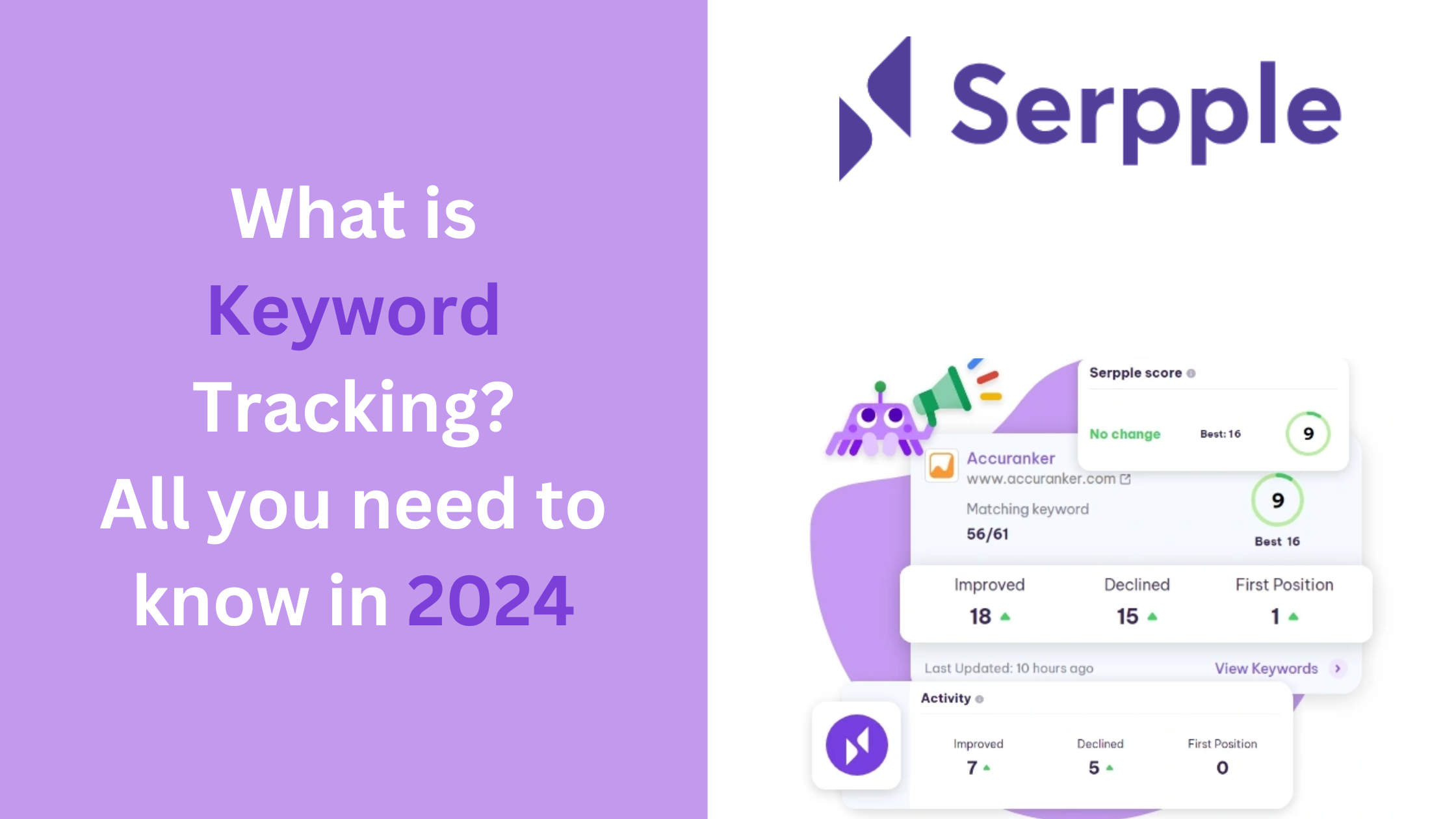
If you have a website, you’ve probably heard of optimizing it with relevant keywords, but you’re not sure which ones and whether you’ve successfully implemented them.
That’s where keyword tracking comes into play – you get to see whether your effort has paid off and if you’re customers will see you or your competitors first.
After reading this article, you’ll know what is keyword tracking and what are different ways to do it so you can choose the one that suits you the best.
But that’s not all as at the end, I’m also sharing proven ways to improve your rankings and stand out from your competitors on search engines.
Table of Contents
What is keyword rank tracking?
Keyword rank tracking is checking out and monitoring how well your website ranks for specific keywords or phrases on search engines like Google.
Rank tracking helps you understand where you stand out regarding visibility and potential traffic so you can tweak your SEO strategy accordingly.
However, not all keywords are created equal. Here are the most important types of keywords to keep an eye on:
- Branded keywords: You should track keywords specific to your brand or product names, for example, “Serpple rank tracker” or “Serpple SEO tool”. Hopefully, you should be the first one to rank for them, but unfortunately, that’s not always the case as your competitors can outrank you even there. Check out this article to find out the differences in tracking branded vs non-branded keywords.
- Transactional keywords: Keywords that show high purchasing intent often contain words like buy, purchase, order, shop, get, sale, deal and discount. For example, “smartwatch order online” or “smartwatch good deals”.
- Target keywords: Target keywords are those precise queries that your ideal customers use when looking for a product or service like yours. For example, if you have a dog grooming business in New York City, an important keyword to monitor would be “dog groomer NYC” or “dog grooming services NYC”. As you can see, target keywords sometimes have a local search intent, but that doesn’t always happen.
- Industry keywords: You should also keep an eye on broad keywords related to your industry, niche or topics covered on your website. For example, our keywords for Serpple’s blog would be “SEO”, “rank tracking”, “keyword rankings” etc. They may not instantly drive sales but they can help you attract relevant traffic.
The benefits of keyword rank tracking
Here’s what makes keyword tracking important and why it should be an essential part of all SEO strategy:
Monitoring competition
Keyword rank tracking helps keep a close eye on your competitors’ performance in search engine results, so you can identify their strengths and weaknesses and adjust your SEO strategy accordingly.
With Serpple, one of the best competitor keyword analysis tools, there’s no need to do this manually as you can directly compare your rankings for all shared keywords and get notified if they outrank you so that you can optimize your content better.
Optimizing ROI
By tracking keyword rankings and analyzing their impact on website traffic and conversions, you can identify high-performing keywords that deliver the best return on investment.
These insights will allow you to direct your SEO efforts more efficiently and use your marketing budget more wisely.
Discovering new trends
Keyword rank tracking helps you stay ahead of emerging trends and shifts in search behavior by monitoring changes in keyword rankings and search volumes.
This puts you one step ahead of the competition, allowing you to capitalize on new opportunities and adapt your content strategy to align with user interests that are constantly changing and evolving.
Making data-driven content
Keyword tracking can help you discover content gaps or popular user queries that are not covered with adequate content so you can be the one to create it and generate traffic.
With these insights, you can create content that resonates with your target audience by identifying relevant topics and optimizing for high-performing keywords.
This article explains in-depth how keyword tracking can help in finding new content.
Buidling authority
When you optimize your content for relevant keywords based on your rank tracking data, you increase the likelihood of your website appearing at the top of the search results for those terms.
As your website consistently ranks well for important keywords in your industry and provides helpful content, people are more likely to perceive it as a trustworthy and authoritative source, making them more likely to do business with you.
Also, website authority can help you rank higher on Google as it signals to search engines that your website provides valuable and reliable resources to visitors, which can lead to improved rankings over time.

What metrics do we track?
Now, it’s time to get more practical. Here are the actual metrics that you should focus on:
- Position: Ranking position is the primary metric to see where your website ranks for specific keywords in search engine results pages. You should direct your SEO efforts to getting to one of the first positions for the keywords that are most valuable to you.
- Visibility: Visibility score or visibility index provides a holistic view of your SEO performance showing you how visible your website is in search results, including both main search results and SERP features. The metric is based on various factors such as keyword rankings, search volume of those keywords and click-through rates.
- Volume: Use SEO tools to see the search volume of the keyword you want to rank for or, in other words, the number of times that keyword was searched for on Google over a given period of time, usually monthly. Positioning your website high for popular keywords can help you reach more potential visitors than focusing on keywords with a low search volume. Also, remember that search volumes can vary during the different times of the year, and check out this article to learn how to optimize website pages for seasonal keywords.
- Traffic: This metric estimates potential traffic your website can get based on its ranking position for a particular keyword, the keyword’s search volume and average CTRs associated with that position. Changes in ranking have a profound impact on your organic traffic, especially if we’re talking about one of the first positions. It’s not uncommon to see that switching from second to first position on Google doubles the number of clicks and organic traffic you get!
How to do keyword rank tracking (step by step)
Manually (traditional way)

Traditional keyword tracking may be enough for tracking individual keywords if you’re just starting out, but it can quickly get time-consuming if you need to track multiple keywords.
However, here’s the best way to do it:
- Identify all the keywords that are relevant to your website, industry or topics and make a list. You can use ChatGPT to help you generate keywords based on your topic, see what your competitors are ranking for or use a keyword research tool to get more ideas.
- Go to Google or any other search engine and enter your specific keyword to see the results that rank for it.
- Scroll until you find your website and count its position/ranking
- Analyze other SERP features like rich snippets to see whether your web page appears there.
- Go back to step #2 and repeat this process for other keywords on your list.
- Write down the current ranking positions of your website for all your target keywords.
There you have it – that’s how you can track keywords manually, completely for free. However, this is just the beginning as it’s not enough to do this once.
Use the rank tracking data you’ve gathered as a starting point and repeat this process on a regular basis (it’d be ideal to do it every week, but you can also do it once a month) to observe changes and patterns over time.
However, although it’s free, I have to say that this is not the most reliable and accurate way to track keyword rankings. If you’re on a tight budget, I suggest checking out these SEO tools for freelancers with very convenient plans and can help you achieve much better results in less time and with less effort.
For a detailed guide on how to track search engine rankings, check out this article with even more practical tips.
Local rank tracking
As I already mentioned in the previous paragraph, Google search results can look completely different for the same keyword, depending on factors like your geo-location, whether you’re using a desktop or mobile phone, and even your previous behavior and interests.
Therefore, when doing manual keyword tracking, you’re getting very personalized search results that may not be 100% accurate.
That’s why it’s much better to use a local rank tracking tool where you can check what search engine results pages for your keyword look like in different countries and cities.
Here’s what you have to do:
- Set location parameters – choose the location for which you want to see the results.
- Enter your keyword and the tool should show you your ranking for that particular keyword in that particular location.
- Pay special attention to SERP features and local search packs and analyze the results that appear there.
- Repeat for other keywords and locations that interest you
Now, here are some bonus tips to optimize your local SEO strategy:
- Update your Google My Business listing by making sure all your data, such as address and phone number, is accurate and people can find you easily
- Add local keywords to your content, headings and meta-tags to improve visibility in local search
- Check whether your business is listed in online directories and citation sites like Yelp or TripAdvisor
Encourage customers to leave you positive reviews on Google and maybe offer a small discount as a sign of appreciation for those who do
With Serpple (the fastest way)
If you’re looking for a better and faster way to track rankings, Serpple might be the best keyword rank-tracking software for you.
Its biggest advantages are daily ranking updates – providing you with fresh real-time data with 99.9% accuracy. This makes it one of the best alternatives to Ahrefs and other expensive keyword tools that update their keyword data on a weekly or monthly basis.
Its interface is super user-friendly and easy to navigate, making is suitable both for beginners and SEO professionals. Here’s all you have to do:
- Add your website domain

2. Add all the keywords you want to track, select a region, language and device for which you want to see search rankings. Also, if you don’t want to add keywords manually, you can upload your keyword list as a CSV or textual file.

3. Here’s how the keyword rankings dashboard looks like: you can see your ranking for each keyword, their search volume, potential traffic and other metrics. You can also see your overall keyword performance or the number of keywords whose ranking improved or declined.

If you’re not sure what keywords you could rank for, Serpple can also help you identify keyword opportunities that have a lot of traffic potential but low competition, making it one of the best tools for long-tail keyword research.
For more ideas, check out our keyword research best practices.
What’s more, you can use Serpple not only for tracking your competitor keywords but also for detailed competitor analysis and getting insights to outrank them.
You can see all the competitors ranking for the same keywords in a unique dashboard and compare their performance to yours.

Also, you can get real-time notifications if any competitor outranks you or if your search engine rankings drop.

Best practices for improving keyword rankings
Optimizing content
Once you identify specific search queries and keywords for which you’d like to rank higher, make sure to use them strategically in the most important positions such as:
- Headings
- Meta tags
- First paragraph
- URLs
- and all throughout the content
But of course, high-quality content requires more than this. Analyze search intent for every keyword and sure that your articles are relevant and provide value to your audience.
Create engaging and well-structured content and make sure to regularly update it with new information and insights to stay relevant.
If you need more tips on search engine optimization, first check out this article to see whether you’re making these common SEO mistakes.
Backlinks
Backlinks are one of the main factors to rank higher on Google and you should always focus on building high-quality links to your website.
Here are a few quick tips:
- Prioritize quality over quantity. Yes, it’s great to have dozens of backlinks but they won’t help you a lot if they’re low-quality links that you’ve simply bought online. You should strive to get backlinks from authoritative websites that are connected with your industry or niche.
- Some of the proven link-building strategies I use are strategic guest blogging, creating valuable infographics, offering to replace broken links on other websites or outreach and creating partnerships.
Use our backlink monitoring tool to keep track of your existing links and get instant notifications if they get broken, removed or changed in any other way.
EEAT
EEAT stands for Experience, Expertise, Authoritativeness, and Trustworthiness and refers to Google’s guidelines for creating quality content that can rank well on search engines. I’ll now break down each part, giving you practical tips on how to implement it:
- Experience: Google prioritizes content that shows first-hand experience as it boosts trust. Therefore, try to include specific details rather than generic information, showing that you’ve actually used the project.
- Expertise: The author’s credibility matters more than ever before, so establish your expertise by showcasing industry knowledge, qualifications and insider tips.
- Authoritativeness: Build a strong reputation by delivering high-quality content and using credible sources, instead of being misleading just for the sake of getting more views.
- Trustworthiness: Add HTTPS encryption to your website to improve security and build trust by adding user reviews and testimonials.
Pillars and clusters around one subject
Here’s one of my favorite content strategies:
Organize your website content around the pillar page, the main page that you want to rank on Google. Then, create supporting “cluster” pages that cover different subtopics and link to your pillar page.
When you interlink your pages this way, you’re showing topical relevance to search engines and increasing the chances of becoming a content authority in your niche.
If you don’t know where to add all those long queries, here’s one secret on how to use long-tail keywords in image SEO optimization that your competitors probably don’t know!
Conclusion
By now you should understand the importance of tracking keyword performance and all the ways to optimize it. There are different ways to do it, but if you’re looking for a solution that’s fast, reliable, accurate and user-friendly at the same time, I guarantee that you’ll find all that in Serpple (and probably even more).
If you’d like to try it first-hand, sign up for our 14-day free trial.
f you commit to tracking keywords consistently over two weeks, you can expect many positive changes, especially if you pair it up with our other features like a powerful keyword research tool, competitor tracking spy and SEO content audit.
Keyword ranking works by monitoring your website’s performance on search engines for particular keywords that interest you. It includes checking their positions, assessing their impact on your overall visibility, traffic and sales and analyzing changes over time to get insights that can help you improve your rankings.
Keyword monitoring means keeping an eye on your (or your competitors’) search engine positioning for particular keywords and noticing whenever your rankings drop or increase.
You can do this manually by typing your desired keyword on Google or any other search engine and counting the results to see what position your website holds. However, this can be time-consuming and inaccurate (as search engine positions can change based on the location and device you use), so it’s much better to use keyword-tracking tools that can do this automatically for you.
Pick a keyword tracking tool, enter your website URL and all the target keywords you want to track. After a while, you’ll be able to see how you rank for all those keywords and you can even get real-time updates whenever your rankings change.
Adam White
Posted on February 26, 2024
Adam White is a 20+ year SEO professional who has optimized over 400 websites, built and sold over 20 internet and SaaS businesses all with SEO as the main traffic source. Follow him on Twitter/X



